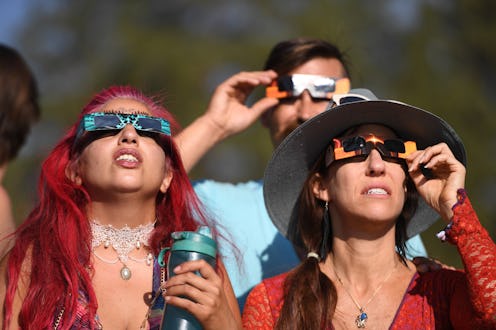Life
What To Do Immediately If You Accidentally Looked At The Eclipse

You didn't mean to, you knew you weren't supposed to... but one thing led to another, and you ended up looking at the sun without glasses during the 2017 solar eclipse. Now you're totally freaking out and looking up things to do immediately if you looked at the eclipse. Yup, despite all the grave warnings, people across the country are remorsefully Googing the fate of their eyes with fear.
The unfortunate truth is, there's not much you can do if you've already had prolonged exposure to the sun's rays during the eclipse. According to specialists, once retinal damage has been done, the effects are secured. Sometimes the damage is only temporary, and unencumbered sight will return in weeks or months, and other times the damage is permanent and will cause untreatable blurriness or blindness. The only way to tell if damage has been done is simply to wait and see. If your retina was indeed damaged from overexposure to the sun during the eclipse, it can lead to something called solar retinopathy — a condition that causes some evidence of visual impairment, very soon after, aka, you'll probably know that something is wrong by the end of the day.
If you're currently experiencing blurred vision, a loss of color vision, blind spots, yellow spots, distortion, or a headache, you might be suffering from the beginning symptoms of said retinal damage. And while this might be incredibly unsettling, there's really nothing you can do but hope for the best. There's no magic eye drop or corrective laser treatment — if the retina is damaged it's irreparable. That said, if you're having any symptoms and believe that you might have over-exposed your eyes, you should most definitely get in touch with your eye specialist and follow their advice, as each case and patient is different.
Typically speaking though, permanent damage to the retina has been shown usually happens in upward of 100 seconds of staring directly into the sun. But important factors to consider are not only the sun's intensity and exposure time, but also the state of the patient's pupil. Additional factors like caffeine and medication can cause the pupils to be even more restricted than usual, which would mean even less sunlight had access to the retina. Though these are all things you should talk about with your doctor, as your vision is nothing to take a gamble with. And if you're hesitant to make an appointment and admit that you looked at the eclipse with a naked eye, don't worry. You're definitely not going to be the first or last person to make that call. Doctors aren't there to judge us, they're there to help us. So don't hesitate to reach out to your specialist, even if you're not sure if you're symptomatic.